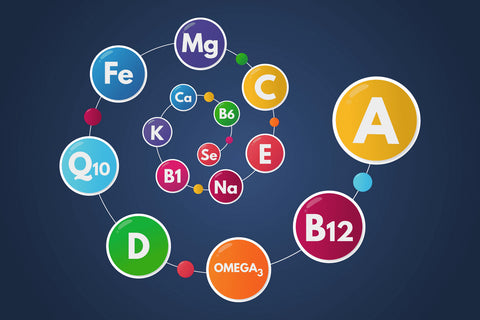We usually associate the idea of nutritional deficiencies with poor regions of the world and the shortage of food, but they are even more common in rich countries, such as the UK. In developed countries, it is not malnutrition that is the key cause of the lack of essential nutrients but consumption of unhealthy and refined foods, avoiding good quality nutritional supplements, chronic stress, and use of popular stimulants.
According to the two-time Nobel Prize winner, Linus Pauling, “Nearly all disease can be traced to nutritional deficiency”. People living in the United Kingdom may experience health problems caused by insufficient intake of any Vitamin or Mineral but the most common and most dangerous is the deficiency of Vitamin D, Vitamin B12, Vitamin K2, Magnesium, Iron, Zinc, and Iodine.
Nutritional deficiencies (lack of Vitamins, Minerals, Trace Elements, and Antioxidants) can cause a range of health problems that are often neglected. Unfortunately, they can be hard to detect and over time they significantly increase the risk of developing many serious conditions.
They can lead to weak immunity, cardiovascular and neurological problems, digestive and metabolic issues, tiredness, hormonal imbalance, impaired cognitive function, weak bones and muscles, hair and skin conditions, insomnia, and many other health problems.

Causes of Nutritional Deficiencies
Both plant and animal foods contain fewer nutrients due to soil depletion, rapid plant growth (resulting in insufficient nutrient accumulation), and other contributing factors (1). Consequently, the nutritional content of our food is often inadequate. Biodynamic farming, rather than organic, appears to be the solution as it can effectively replenish the soil. While organic foods contain fewer pesticides and herbicides, they do not significantly surpass conventional foods in nutrient levels.
The situation is exacerbated by the fact that many individuals today predominantly consume refined products, which are either low in nutrients or may deplete them from their bodies. Among the most harmful are foods high in refined sugar, glucose or high fructose corn syrup (HFCS), polished rice, and refined grain products like white bread, doughnuts, cakes, biscuits, and refined pasta.
Chronic psychological stress and the consumption of stimulants, including popular caffeine products and alcohol, further contribute to nutritional deficiencies and overall poor health (2).
It is believed that in cold or cloudy regions, such as England, almost everyone is at risk of Vitamin D deficiency. In the United States, approximately 90% of the population is deficient in this vitamin.
Surprisingly, even in hot and sunny countries, Vitamin D deficiency remains prevalent. In India, for instance, approximately 80% of the population lacks adequate Vitamin D levels (3). This situation arises from two main factors. First, individuals in these areas do not regularly expose their uncovered skin to sunlight around noon time.
The second and equally significant cause of Vitamin D deficiency is the widespread Magnesium deficiency, as Vitamin D remains inactive in the absence of sufficient Magnesium levels in the body.
Furthermore, individuals with darker skin tones require significantly more sun exposures to maintain healthy Vitamin D levels. This is because darker skin contains more melanin, which protects against ultraviolet radiation and reduces the production of cholecalciferol from cholesterol under the skin.
While there are some dietary sources of Vitamin D, such as certain types of fish and mushrooms, their regular consumption is not a safe option. This is so because fish often contain high levels of heavy metals and other harmful chemicals.
Mushrooms, on the other hand, are often contaminated with dangerous moulds. Additionally, the concentration of Vitamin D in these foods is far from sufficient to meet our daily requirements.
Regular consumption of 1-2 tablespoons of cod liver oil could potentially improve Vitamin D levels, provided it is free from heavy metals. According to the National Institutes of Health, each tablespoon provides 1,350 IU of Vitamin D.
However, even this amount falls short of the daily requirement for adults, which is at least 4000 IU. Another concern with cod liver oil is its taste and the fact that 1 tablespoon may supply an excessive amount of Vitamin A, which is not advisable.
Taking into consideration the above-listed facts, it seems that taking the right amounts of Vitamin D3 in the form of nutritional supplements is the only and most practical solution.
Symptoms Caused by Specific Nutritional Deficiencies
MAGNESIUM DEFICIENCY: Muscle, stomach cramps, and menstrual cramps, spastic colon, sleep difficulties (despite feeling tired), morning sickness, mood problems, anxiety, cognitive problems, cravings for sugar and salt, constipation (4).
Dr Norman Shealy, a renowned expert on Magnesium, has stated that “nearly every known illness can be linked to a magnesium deficiency.”
VITAMIN D DEFICIENCY: Poor bone and muscle health, weakened immunity, frequent infections, autoimmune conditions, high risk of developing cancer, depression, hypertension, diabetes, skin conditions, infertility, and brain damage.
Deficiency in this Vitamin is common, especially among the elderly and vegans. However, today also meat-eaters are often deficient because animals are often treated with antibiotics that kill bacteria that make B12 in the intestines.
VITAMIN B12 DEFICIENCY: Anaemia, mental fog, fatigue, numbness and tingling in extremities, low white blood cell count, dementia, muscle weakness, sleep problems, mouth sores, mood disturbances, neurological pain, and complications during pregnancy (5).
ZINC DEFICIENCY: Recurrent infections, hair and skin problems, hormonal imbalance, poor focus and memory, low mood, nail abnormalities, changes in appetite, cravings for salty or sweet foods, low stamina and libido, fertility and prostate issues, allergies, impaired protein digestion.
IODINE DEFICIENCY: Thyroid problems, higher risk of ovarian and breast cancer, weight gain, dry skin, muscle and joint pain, mental impairment, menstrual irregularities, and menstrual cycle problems (6).
IRON DEFICIENCY: Anaemia, poor memory, dizziness, hair loss, tongue issues, depression, and anxiety.
Chronic iron deficiency may also contribute to fibromyalgia, inflammatory bowel disease, hypothyroidism, neurodegenerative conditions, restless leg syndrome, and muscle weakness (7).
Recommended Daily Intake
MAGNESIUM: Consider taking Magnesium with high bioavailability, such as Magnesium Bisglycinate or Magnesium Citrate powder (without any binders or fillers).
Take 150-200mg approximately 30 minutes before breakfast and the same amount about an hour before bedtime.
VITAMIN D3: Experts recommend a daily intake of around 5,000 IU of Vitamin D3 with breakfast 5-6 days a week. Ensure that you also incorporate Magnesium supplementation because Vitamin D relies on Magnesium for its own activation.
In addition, Vitamin D supplements can lead to Magnesium deficiency, resulting in sleep disturbances, muscle cramps, and other symptoms.
VITAMIN B12: 1,000-2,000 mcg after breakfast of B12 in the form of sublingual Methylcobalamin. High dosages of supplemental B12 are necessary because only around 1% of it is actually absorbable.
Vitamin B12 offers protection to nerves from potential damage due to high blood glucose levels and toxins, while also acting as an energy booster and detoxifier.
Also, if you are on Warfarin, statins, or antacids, you should take 2,000 mcg of B12 daily.
ZINC: 10-15mg with main meals, one or two times a day. Ensure that your Zinc supplement contains approximately 0.5 mg of Copper for every 10-20mg of Zinc.
IODINE: Since the average daily Iodine intake of healthier Japanese individuals is much higher than the recommended 150mcg, you may need more Iodine.
Consider supporting your diet with Iodine-rich natural sources such as Kelp tablets. It will support your thyroid health, immunity, brain health, and metabolism.
IRON: If you are deficient in Iron, opt for Iron Bisglycinate, which is regarded as the best among Iron supplements due to its high bioavailability and minimal gastric side effects, such as constipation. To enhance absorption, combine it with Vitamin C.
To prevent the oxidative effects of excess iron, take it with 250-500mg of Alpha lipoic acid.
Additionally, to avoid iron deficiency, reduce your consumption of coffee, black tea, and green tea.
Other Nutrients
It's also advisable to obtain other essential minerals and trace elements like Selenium, Boron, Chromium, Molybdenum, and Manganese in a well-formulated Multivitamin formula such as A-Z Multivit.
Related articles
Sources
- Nutrient-Depleted Soil: What It Means for Our Food - Chris Kresser
- https://pubmed.ncbi.nlm.nih.gov/34538097/
- https://www.mdpi.com/2072-6643/6/2/729
- https://draxe.com/nutrition/9-signs-magnesium-deficiency/
- https://draxe.com/nutrition/vitamin-b12-deficiency-symptoms/
- https://draxe.com/nutrition/iodine-deficiency/
- https://draxe.com/nutrition/iron-deficiency/
IMAGE ATTRIBUTIONS: Image by Freepik, Image by pch.vector on Freepik
Any information or product suggested on this website is not intended to diagnose, treat, cure or prevent any medical condition. Never disregard medical advice or delay in seeking it because of something you have read on this website. Consult your primary healthcare physician before using any supplements or making any changes to your regime.








